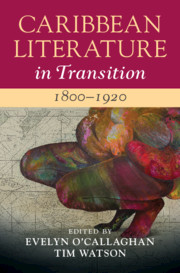Book contents
- Caribbean Literature in Transition, 1800–1920
- Caribbean Literature in Transition
- Caribbean Literature in Transition, 1800–1920
- Copyright page
- Contents
- List of Illustrations
- Contributors
- Acknowledgements
- Introduction
- Part I Literary and Generic Transitions
- Part II Cultural and Political Transitions
- Chapter 8 John Jacob Thomas and the Grammar of Freedom
- Chapter 9 How Barbados Transformed Radical British Author Eliza Fenwick into a Reactionary
- Chapter 10 Mary Seacole’s Travels and Tales
- Chapter 11 Genealogy and Nonhistory in Adolphus, A Tale
- Chapter 12 Obeah, Religion, and Nineteenth-Century Literature of the Anglophone Caribbean
- Part III The Caribbean Region in Transition
- Part IV Critical Transitions
- Bibliography
- Index
Chapter 10 - Mary Seacole’s Travels and Tales
from Part II - Cultural and Political Transitions
Published online by Cambridge University Press: 16 December 2020
- Caribbean Literature in Transition, 1800–1920
- Caribbean Literature in Transition
- Caribbean Literature in Transition, 1800–1920
- Copyright page
- Contents
- List of Illustrations
- Contributors
- Acknowledgements
- Introduction
- Part I Literary and Generic Transitions
- Part II Cultural and Political Transitions
- Chapter 8 John Jacob Thomas and the Grammar of Freedom
- Chapter 9 How Barbados Transformed Radical British Author Eliza Fenwick into a Reactionary
- Chapter 10 Mary Seacole’s Travels and Tales
- Chapter 11 Genealogy and Nonhistory in Adolphus, A Tale
- Chapter 12 Obeah, Religion, and Nineteenth-Century Literature of the Anglophone Caribbean
- Part III The Caribbean Region in Transition
- Part IV Critical Transitions
- Bibliography
- Index
Summary
This essay examines how Mary Seacole’s autobiography-cum-travelogue, Wonderful Adventures of Mrs Seacole in Many Lands (1857), uses revisionary mimicry to engage the tropological schema of colonial and imperial discourses. Seacole artfully deploys recodings and revisions that generate a nascent poetics of colonial identity and subjectivity. Her narrative unfolds as a drama of self-construction that locates the individual colonial subject within the nexus of mid-Victorian ideologies of industry, adventure, gender, race, and nation. It reverses the trajectory of imperial travel narratives as it relates the struggle to move from the colonial periphery to the imperial centre. Wonderful Adventures of Mrs Seacole in Many Lands complicates contemporary attempts to define it as counter-discourse, as it is permeated by contradictions and ambiguities that highlight the problematic nature of hybridity in Seacole’s own self-construction. Wonderful Adventures is thus marked by the implicit tensions of Caribbean colonial relations despite Seacole’s apparent erasure of the politics of the post-Emancipation British Caribbean.
Keywords
- Type
- Chapter
- Information
- Caribbean Literature in Transition, 1800–1920 , pp. 168 - 181Publisher: Cambridge University PressPrint publication year: 2021

